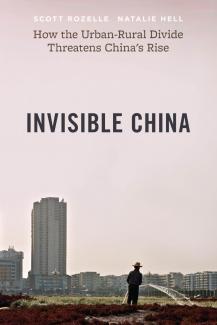Event
 Invisible China: How the Urban-Rural Divide Threatens China’s Rise
Invisible China: How the Urban-Rural Divide Threatens China’s Rise
Judith and Marshall Meyer Lectures on China’s Economy
Scott Rozelle, Helen F. Farnsworth Professor of Economics, Stanford University

Professor Scott Rozelle discusses his most recent book Invisible China: How the Urban-Rural Divide Threatens China’s Rise, co-authored with Natalie Hell.
China’s growth has relied heavily on unskilled labor. Most of the workers who have fueled the country’s rise come from rural villages and have never been to high school. While this national growth strategy has been effective for three decades, the unskilled wage rate is finally rising, inducing companies inside China to automate at an unprecedented rate and triggering an exodus of companies seeking cheaper labor in other countries. Ten years ago, almost every product for sale in an American Walmart was made in China. Today, that is no longer the case. With the changing demand for labor, China seems to have no good back-up plan. For all of its investment in physical infrastructure, for decades China failed to invest enough in its people. Recent progress may come too late. Drawing on extensive surveys on the ground in China, Rozelle and Hell reveal that while China may be the second-largest economy in the world, its labor force has one of the lowest levels of education of any comparable country. Over half of China’s population—as well as a vast majority of its children—are from rural areas. Their low levels of basic education may leave many unable to find work in the formal workplace as China’s economy changes and manufacturing jobs move elsewhere.
In Invisible China, Rozelle and Hell speak not only to an urgent humanitarian concern but also a potential economic crisis that could upend economies and foreign relations around the globe. If too many are left structurally unemployable, the implications both inside and outside of China could be serious. Understanding the situation in China today is essential if we are to avoid a potential crisis of international proportions.
This event will be held on-site in the CSCC conference room, but with a Zoom option.
To attend in person:
Please use this link to RSVP for this event: https://www.eventbrite.com/e/invisible-china-how-the-urban-rural-divide-threatens-chinas-rise-tickets-191893648067
You must be a Penn Card holder. Please indicate in the RSVP link that you plan to attend in person. Under the university’s current COVID-19 protocols, we must limit on-site attendance at our events to Penn card holders and, to comply with contact-tracing requirements, we must have a record of who attends our in-person events. Therefore, we are asking that you RSVP is you plan to attend in person. If you do not RSVP and still wish to attend, you are still welcome to show up, but will need to sign in on arrival. Although social distancing is not required under current university rules, we will be limiting the number of people in our conference room to somewhat less than our past highest turnout events.
To participate by Zoom:
We understand that some of you will be unable or uncomfortable attending in person, but wish to participate. We will send you a Zoom link if you register: https://upenn.zoom.us/meeting/register/tJAoduGtrzgrEta7skf0C_TVEYAhicTffWmx
Scott Rozelle is the Helen F. Farnsworth Senior Fellow and the co-director of the Rural Education Action Program in the Freeman Spogli Institute for International Studies at Stanford University. His research focuses almost exclusively on China and is concerned with: agricultural policy, including the supply, demand, and trade in agricultural projects; the emergence and evolution of markets and other economic institutions in the transition process and their implications for equity and efficiency; and the economics of poverty and inequality, with an emphasis on rural education, health and nutrition. He has been published in top academic journals and has authored over 500 articles, chapters, and books.
